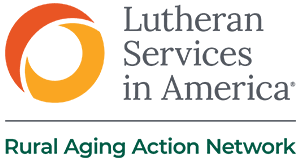Rural Aging Action Network
- Need: To connect isolated older adults and family caregivers in rural Minnesota, Montana, North Dakota, and South Dakota to services and supports so they can age in place.
- Intervention: The Rural Aging Action Network is a national collaborative of organizations that mobilize whole communities to address gaps in care for rural older adults and family caregivers.
- Results: Since 2022, the collaborative has reached over 1,000 older adults and over 200 family caregivers living in rural communities.
Description
Older adults in rural areas can struggle to access aging-related services, transportation to medical appointments, and social opportunities. To support older adults living in Minnesota, Montana, North Dakota, and South Dakota, Lutheran Services in America created the Rural Aging Action Network (RAAN). The RAAN works with older adults and family caregivers to assess their unique health-related social needs, connect them to services, and provide follow-up.

Lutheran Services in America has awarded grant funding to the following organizations to support the collaborative: Lutheran Social Service of Minnesota, St. John's United and Immanuel Living in Montana, Missouri Slope Lutheran Care Center in North Dakota, and Lutheran Social Services of South Dakota.
Services offered
A RAAN Leader meets with older individuals and family caregivers to assess their needs through a whole-person lens and learn of any challenges related to social determinants of health like transportation, safe housing, food security, and social supports. The Leader then refers and connects these individuals to community partners and organizations and provides follow-up.
In addition to the RAAN coordination efforts, organizations in the collaborative offer the following services:
- Caregiver supports & services in Minnesota, including emergency care planning, respite care, educational classes, and support groups
- Companionship in North Dakota and South Dakota, including social engagement and assistance with transportation or light household chores
- At Home in Montana, which provides concierge-level service to older adults, including assistance with home maintenance, light meal prep, medication management, and connections through social outings
- Respite Suites in Montana, which provides private suites and personal care, if needed, for adults over 65 so caregivers can take respite
- Behavioral health in South Dakota offering 5 free sessions of behavioral health assessment, counseling, and coaching
- Financial counseling in South Dakota offering one-on-one financial counseling and resources
Results
Since 2022, the Rural Aging Action Network and its 20 rural health leaders have worked with over 1,000 older adults and over 200 family caregivers, connecting them to over 1,800 services addressing food security, social isolation, housing safety, healthcare, caregiver services, and transportation challenges.
This 6-minute video shares the lived experiences of older adults and caregivers living in rural Wilton and Regan, North Dakota:
More stories are available in the Rural Aging Action Network's "Coming Together" video series.
Lutheran Services in America wrote about its approach in a report called "Building on the Strengths of Rural Communities: Lessons Learned from the Rural Aging Action Network." You can request the full report from the Lutheran Services in America website.
Challenges
It takes considerable time to build trust with community partners, older adults, and caregivers in rural communities. Lutheran Services in America chose five organizations (listed above) to lead Rural Aging Action Networks because of their long-standing presence and leadership in these communities. Furthermore, rural communities generally can be seen as having fewer resources or presence of other healthcare and aging services providers. To assist with these challenges, the RAAN Collaborative partnered with the ABCD Institute for a series of trainings and exercises to strengthen their capacity in identifying and leveraging unique resources and assets in the community.
The RAAN Collaborative works with older adults and family caregivers in rural communities who can have difficulty asking for or accepting assistance. The RAAN Collaborative initially asks older adults about their joys, hobbies, and passion to build a relationship before asking about challenges and connecting them to resources.
Replication
Identify assets in your community. For example, the RAAN Collaborative utilizes the ABCD Institute's 6 types of assets: individuals, institutions, associations, physical space, culture and stories, and economic exchange. Educate community members on the challenges facing older adults and family caregivers and invite these partners to be part of the solution.
Rural communities are often tight-knit and are willing to help their neighbors when invited. For example, youth groups may be able to offer technology assistance or do yard work for older adults.
When thinking of outreach and communication, pick locations where older adults or their family caregivers gather, such as churches, libraries, restaurants, or senior centers.
Use plain language and authentic imagery when promoting your program. The RAAN Collaborative used images of pastures and farms to promote the program and phrases such as "Aging where you put down roots can be difficult" or "Resources to ensure that you enjoy the fruits of your labor."
For more information on implementing the RAAN model in your community, contact Regan McManus.
Contact Information
Regan McManus, Director of Aging InitiativesLutheran Services in America
Rural Aging Action Network
rmcmanus@lutheranservices.org
Topics
Aging and aging-related services
· Community and faith-based initiatives
· Community engagement and volunteerism
· Elderly population
· Home and community-based services
· Social connectedness
· Social determinants of health
States served
Minnesota, Montana, North Dakota, South Dakota
Date added
February 22, 2023
Suggested citation: Rural Health Information Hub, 2026 . Rural Aging Action Network [online]. Rural Health Information Hub. Available at: https://www.ruralhealthinfo.org/project-examples/1108 [Accessed 18 January 2026]
Please contact the models and innovations contact directly for the most complete and current information about this program. Summaries of models and innovations are provided by RHIhub for your convenience. The programs described are not endorsed by RHIhub or by the Federal Office of Rural Health Policy. Each rural community should consider whether a particular project or approach is a good match for their community’s needs and capacity. While it is sometimes possible to adapt program components to match your resources, keep in mind that changes to the program design may impact results.
